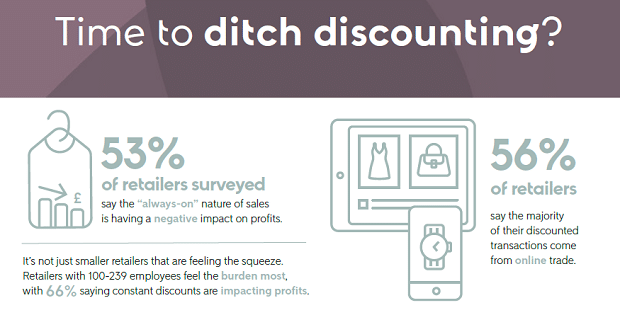
Retailers are under increasing pressure to discount to keep up with competition and rising customer expectations, and the negative impact this has on retailers’ bottom lines.
The research, by leading payments provider Klarna, shows that discounting is no longer confined to the traditional winter and summer sales. The new rules of retail mean discounting has become a fluid and unpredictable phenomenon – with over half (57%) of consumers expecting regular sales.
The research also shows that:
- 53% of merchants admit the “always on” nature of sales are damaging profits, with over one in 10 (11%) saying discounting cost them over £25,000 throughout 2017.
- There are signs that consumers are also gradually turning away from constant discounting, with a quarter (25%) of consumers say they are less likely to shop regularly with a retailer who always has sales on
- There’s a growing demand for more thoughtful, personalised sales tactics, with 45% saying they are more likely to shop if they were sent a personalised offer.
The research of 500 British retailers highlighted the negative impact this can have on the bottom line of merchants. Over half of retailers surveyed (53%) say the “always on” nature of sales is having a negative impact on profits – and shockingly, over one in 10 (11%) saying discounting cost them over £25,000 throughout 2017. This isn’t felt just by smaller retailers, but merchants of all sizes – in fact, it’s those with 100-239 employees that feel the burden most with 66% saying constant discounts are impacting profits.
The eCommerce channel is particularly vulnerable, with 56% of retailers saying the majority of their discounted transactions come from online trade.
Commenting on the research, Luke Griffiths, Managing Director at Klarna UK, said: “Discounting can be a significant source of stress for retailers of all sizes – from the impact on profits to the operational difficulties that come with managing sales activity. Many merchants will discount to shift unwanted stock, so part of the solution is to make better, more educated purchasing decisions.”
“But our research also shows how retailers can win over customers without slashing prices. Instead of discounting, merchants would do well to focus on perfecting the customer journey – from an inspirational browsing experience through to a seamless checkout phase, with multiple payment options and one-click repeat purchase options.”
Are consumers overwhelmed by always-on discounting?
To better understand this sales spiral, Klarna also surveyed consumers to discover the psychology behind customer attitudes towards discounting and how it influences buyer behaviour. The results showed that 18% of respondents only shop when there is a sale on – with millennials (23% of 25-34 year olds) and gen Z (22% of 16-24 year olds) most likely to wait for sales to shop, compared to 11% of over 55s.
Encouragingly, there are signs that customers are gradually turning away from the frenzy generally associated with discounting, instead searching out a positive shopping experience. Over a quarter (28%) say sales are too stressful and avoid them altogether, so there are benefits for retailers looking to break out of the discounting cycle by providing a better customer journey.
There’s also a growing demand for more thoughtful, personalised sales tactics, with 45% saying they are more likely to shop if they were sent a personalised offer. And results showed that constant sales can in fact damage brand value and perception: a quarter (25%) of consumers say they are less likely to shop regularly with a retailer who always has sales on, and 38% say that constant sales make a brand look cheap and unfashionable.
How can merchants avoid the sales spiral?
With many consumers viewing sales shopping as a stressful, negative experience, there’s scope for retailers instead to turn to more shopper-centric initiatives to win business and loyalty. Over a third of customers surveyed (36%) would be more likely to buy full price items if they were able to pay later once they had received the goods and decided what to keep. Offering multiple payment options at the point of sale – both online and in store – gives shoppers choice, convenience and financial flexibility.
Luke Griffiths continued: “Providing an exceptional customer journey at any time of year is vital. It’s clear that merchants and consumers are increasingly disillusioned with discounting and should look instead to ‘surprise and delight’ shoppers in the everyday user experience. They can do this with features such as a mobile-optimised checkout, one-click purchases, deferred payment options and personalisation.”
Andy Mulcahy, Strategy and Insight Director at IMRG, the UK’s industry association for online retail, added: “In recent years, events such as Black Friday have instilled in shoppers’ minds the idea that there are times of year when desirable product ranges – as distinct from the excess stock that is typically reduced to clear during seasonal sales periods – will have their prices slashed. The impact of this was particularly apparent in October 2017, when heavy discounts were already available across multiple retailers, as they tried to stimulate activity among shoppers who were holding out for Black Friday. Using discounting as a means for triggering activity is nothing new, the difference today is that it seems to be more regular and more widespread than was the case previously. That said, getting the basics right – selling items that genuinely appeal to the target demographic, optimising areas of the experience, providing leading service – remains the most effective method for increasing sales in a way that is far less reliant on discounting.”
The research into the views of 1000 UK consumers and 500 retail decision makers was carried out by CensusWide in March 2018.
